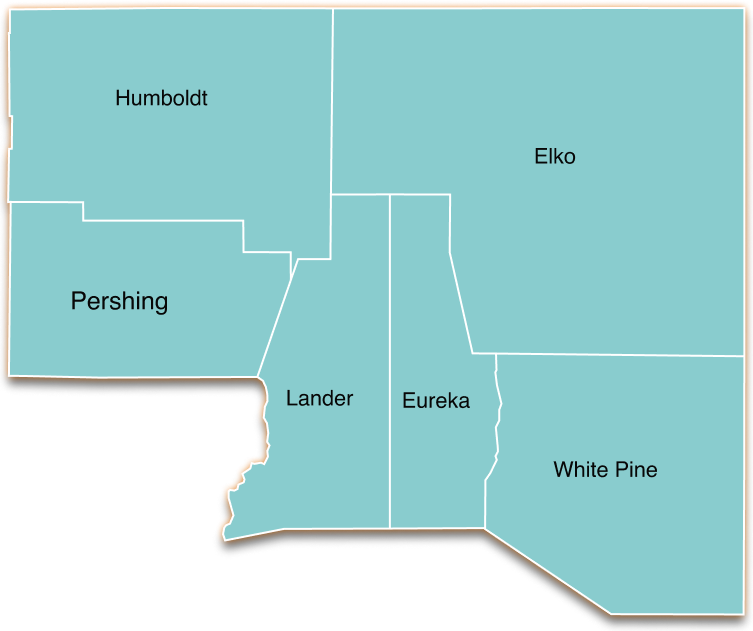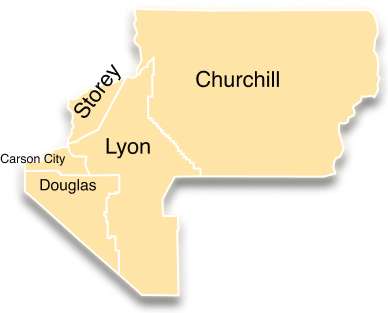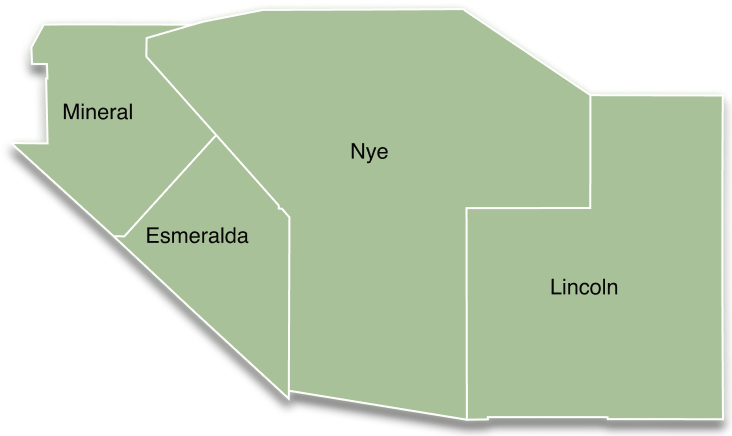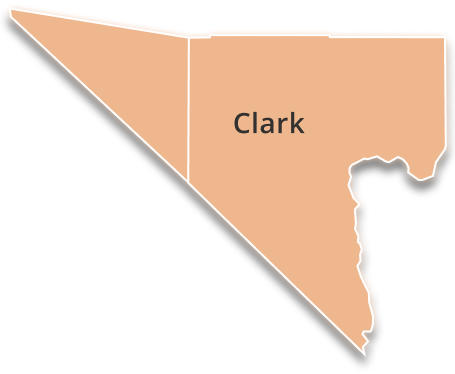The Clark Behavioral Health Region
In 2019, the estimated population for Clark County was 2,282,226, a 16.5% increase from the 2010 estimated population. With 73.6% of Nevada’s population living in Clark County, it is the most populous area in the state. Continued growth is projected to reach slightly above 2.85 million by 2035. Long-term population forecast more than 3.16 million Clark County residents by 2060.
During the 2017 session, regional behavioral health boards were formed to address behavioral health in Nevada. The regions were redrawn during the 2019 session and Nye County was split into regions. The northern half of Nye County is part of the Southern Region and the southern half is part of the Clark County Region. For data purposes, Nye County data is included in the Southern Region.
CHAR FROST Board Chair, Director, Family and Youth Engagement, Magellan Health
JAMIE ROSS Vice-Chair, Executive Director PACT Coalition
SENATOR FABIAN DOÑATE, MHA Legislator, Nevada Senate District 10
LESLEY DICKSON Center for Behavioral Health, Nevada Psychiatric Association
DAN MUSGROVE Vice President Strategies 360’s
MICHELLE GUERRA, MBA, MSHA, CPC, LCADC Vice President of Quality Assurance Nevada Behavioral Health
JACQUELINE HARRIS MA, MFT, LADC Marriage and Family Therapist
DENEESE PARKER, MSW, CADC Assistant Court Administrator, Eighth Judicial District Court
ARIANA SAUNDERS, MA Associate Director, Training Center, The Corporation for Supportive Housing
CAPTAIN NITA SCHMIDT North Valley Bureau, Las Vegas Metropolitan Police Department
CORY WHITLOCK, PA-C Las Vegas Fire and Rescue
SEAN O’DONNELL, MS Executive Director, Foundation for Recovery
JOSE L MELENDREZ, MSW Executive Director Office of Community Partnerships UNLV School of Public Health
Vacant Regional Behavioral Health Coordinator, Clark County Social Service
The Clark Regional Policy Board continues to embrace a data-driven approach to identifying the behavioral health needs and system gaps of the region. That said, the success of a data-driven approach depends on the existence of data, the quality of the data gathered, as well as the rigor and pertinence of its analysis and interpretation.
- Mental health oversight agency and workforce development issues.
- Dedicated funding for crisis services for children and adults.
- Residential treatment services for youth.
- Increasing collaboration on the spectrum of substance misuse and its relation to mental health.
Recovery is a process of change through which people improve their health and wellness, live self-directed lives, and strive to reach their full potential. There are four major dimensions that support recovery:
- Health—overcoming or managing one’s disease(s) or symptoms and making informed, healthy choices that support physical and emotional well-being.
- Home—having a stable and safe place to live.
- Purpose—conducting meaningful daily activities and having the independence, income, and resources to participate in society.
- Community—having relationships and social networks that provide support, friendship, love, and hope.
Areas identified as assets and gaps in Clark County are:
Expansion of Crisis Call Center Hubs
Expansion of Mobile Crisis Teams
Creation of Crisis Stabilization facilities
Crisis Now, a model used in California, Arizona, Washington, and Georgia to centralize crisis services and make them community based. The regional behavioral health coordinators worked with the State and Social Entrepreneurs, Inc. (SEI) to operationalize their models. Clark County has a crisis response team through Las Vegas Fire and Rescue. Desert Parkway Hospital has a mobile crisis team that goes to emergency rooms to evaluate and transport patients to their hospital for additional care.
The Clark Regional Behavioral Health Policy Board and the Clark Regional Behavioral Health Coordinator are currently working with communities to identify appropriate initiatives to implement within the region.
The Clark Regional Behavioral Health Policy Board and the Clark County Children’s Mental Health Consortium support the development of robust community-based services and supports to reduce reliance on residential treatment.
If you or someone you know is in need of rental, utility or transportation assistance, please call Clark County Social Service at 702-455-4270 or visit clarkcountynv.gov/social-service/
- 211 conversations are confidential, can be made anonymously, and are available in 180 languages upon request.
- If you prefer to text, use web chat, or search for resources online, click here to find more ways to contact your local 211
Other Mental Health Hotlines
- National Suicide Prevention Lifeline: 1-800-273-8255
- Veterans Crisis Line: call 1-800-273-TALK (8255) and press 1; or text 838255
- Crisis Text Line: text the word ‘Home’ to 741-741
- The Trevor Lifeline for LGBTQ Youth: call 1-866-488-7386
- The Trans Lifeline: call 1-877-565-8860
Click to select Behavioral Health Region






Health Region
Health Region
Health Region
Health Region
Health Region
february, 2026
Publications and Reports
| Type | Group | Name | Region | Date | Download |
|---|---|---|---|---|---|
| Resources | Resource Directory – Southern Nevada -MHS_Vol6_Iss1_Final-4 | Clark, National, Nevada Statewide, Southern | 02/04/2026 | Preview Download | |
| Resources | Mental Health Spectrum – Vol5_Iss4_Final-2 (December 2025) | Clark, Nevada Statewide, Northern, Southern | 12/10/2025 | Preview Download | |
| Advocacy, Best Practices, Community Collaboration, Criminal Justice System (CJS) | Nevada & DOJ Agreement – Webinar Slides and Agreement 2.14.25 | Clark, National, Nevada Statewide, Northern, Rural, Southern, Washoe | 02/14/2025 | Preview Download | |
| Resources | MHS_Vol5_Iss1_Promoting Healthy Behaviors | Clark, Nevada Statewide, Southern | 02/05/2025 | Preview Download | |
| Advocacy, Education | “Advocacy 101” Webinar Slides 1.27.25 | Clark, Nevada Statewide, Northern, Rural, Southern, Washoe | 01/27/2025 | Preview Download | |
| Data, Education | Webinar Slides: “Nevada’s Behavioral Health Workforce Data Overview” 1.22.25 | Clark, Nevada Statewide, Northern, Rural, Southern, Washoe | 01/22/2025 | Preview Download | |
| Advocacy, Best Practices, Education | Webinar Slides: The Future of Substance Use Initiatives 1.17.25 | Clark, Nevada Statewide, Northern, Rural, Southern, Washoe | 01/17/2025 | Preview Download |


